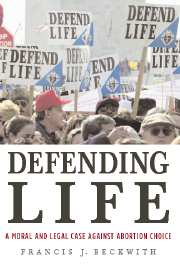Book contents
- Frontmatter
- Contents
- Acknowledgments
- Introduction
- PART I MORAL REASONING, LAW, AND POLITICS
- 1 Abortion and Moral Argument
- 2 The Supreme Court, Roe v. Wade, and Abortion Law
- 3 Abortion, Liberalism, and State Neutrality
- PART II ASSESSING THE CASE FOR ABORTION CHOICE AND AGAINST HUMAN INCLUSIVENESS
- PART III EXTENDING AND CONCLUDING THE ARGUMENT
- Notes
- Selected Bibliography
- Index
3 - Abortion, Liberalism, and State Neutrality
from PART I - MORAL REASONING, LAW, AND POLITICS
Published online by Cambridge University Press: 05 June 2012
- Frontmatter
- Contents
- Acknowledgments
- Introduction
- PART I MORAL REASONING, LAW, AND POLITICS
- 1 Abortion and Moral Argument
- 2 The Supreme Court, Roe v. Wade, and Abortion Law
- 3 Abortion, Liberalism, and State Neutrality
- PART II ASSESSING THE CASE FOR ABORTION CHOICE AND AGAINST HUMAN INCLUSIVENESS
- PART III EXTENDING AND CONCLUDING THE ARGUMENT
- Notes
- Selected Bibliography
- Index
Summary
“Statecraft,” Aristotle wisely instructed his pupils, “is soulcraft,” by which he meant that the moral premises embedded in the social and legal fabric of a political regime provide direction and sustenance for the character and beliefs of its citizens. That is, what is tacitly accepted by a people and its institutions, in its practices and principles, will tell us more about what it embraces as good, true, and beautiful than all of its verbal declarations to the contrary. Nevertheless, on the issue of abortion, a number of thinkers have argued that the current regime in American law – the Roe v. Wade framework – is proof that Aristotle was mistaken, that the state may, and ought to, remain impartial on abortion without commiting itself to any particular view of humanity. We have already seen in our assessment of Roe (Chapter 2) that the Court did not succeed. Several thinkers, however, have presented arguments they believe can rescue this opinion and provide explicit philosophical justification for abortion rights while the state remains impartial on the question of whether the unborn has protected moral status. In this essay we will assess the cases made by Paul D. Simmons and Judith Jarvis Thomson.
Although the late John Rawls's political liberalism is often associated with the point of view I critique in this chapter, his last published words on the matter seem to be consistent with the sort of case I am making in this book, that the pro-life position can be defended with publicly accessible reasons that may be incorporated into our laws without violating any fundamental rights, or what Rawls called “constitutional essentials.”
- Type
- Chapter
- Information
- Defending LifeA Moral and Legal Case against Abortion Choice, pp. 42 - 62Publisher: Cambridge University PressPrint publication year: 2007



